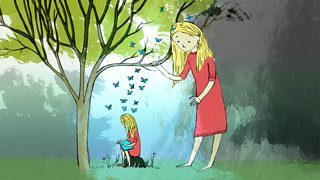Why do we secretly feel pleased when our best friends fail?
21 March 2019
We may not care to admit it, but we’ve all felt it: that frisson of guilty pleasure when learning of another person’s bad luck.
The misfortune of others tastes like honeyJapanese saying
It’s known as schadenfreude, which translates from German as damage joy.
“We enjoy it when people who have done something bad or who are hypocrites are caught,” explained cultural historian Tiffany Watt Smith.
“Or maybe it’s as silly as the person who pushed past you on the station stairs then missing their train.”
Even our best friends aren’t immune and it can point to envy, competitiveness or our sense of inferiority. But Tiffany believes it’s nothing to be ashamed of.
“It’s a very natural and normal response. It’s part of how we make ourselves feel better when we are presented with unfairnesses in life.”

Why do we take pleasure in celebrities’ misfortunes?
Tiffany Watt Smith reveals our long history of schadenfreude.
Public schadenfreude
The internet appears to be bringing this formerly shameful emotion out into the open.
According to Tiffany, not only is schadenfreude is much more visible than it used to be, its effects are long-lasting.
“What might have been [reserved to] a sly snigger around the watercooler, or a small grin shared between colleagues when you boss gets someone’s name wrong in a presentation, suddenly it’s writ large on the internet, with people sharing and liking and it’s preserved in the digital aspic.”
����ý Ideas: The shame of schadenfreude

Why do we feel joy at another's distress?
Historian Tiffany Watt Smith says we shouldn't feel ashamed to feel schadenfreude.
More complex human emotions
-
![]()
Shame
Aleks Krotoski explores whether technology is changing our relationship with shame.
-
![]()
Anger
Oliver Burkeman explores how anger may be essential for positive social change.
-
![]()
Regret
Exploring moments of reckoning because of something we did.
-
![]()
Disgust
The link between moral revulsion and a physiological reaction.
-
![]()
Sunday Morning with Richard Holloway
Former Imam Yahya Barry shares his life story, a fresh look at schadenfreude, the age of anxiety and a pilgrimage with a difference.
Latest features from ����ý Scotland
-
![]()
'Wild swimming helps me process the grief of losing my son'
The benefits of cold water therapy.
-
![]()
Winter adventures are appealing, but an expert advises caution
Trips in winter require particular knowledge and skills.
-
![]()
The rescuers: Why volunteers risk their lives in mountain emergencies
Landward meets members of the Cairngorm Mountain Rescue Team.
-
![]()
‘Look for the light’ – practical tips to help you through another winter with SAD
Useful advice and tips to combat low moods at this time of year.
-
![]()
How you could be a binge drinker without even knowing
Binge drinking is classed as fewer units than many people may realise.
-
![]()
How chocolate biscuits and drama classes helped one man leave prison behind
The healing power of creativity.
-
![]()
'When people believe in you, it’s life-changing'
Author Graeme Armstrong revisits the man who helped turn his life around.
-
![]()
The 'breath-taking' display of US birds swept on to British soil
Recent storms have brought rare birds to our shores.
-
![]()
Six things we learned about Alan Cumming on Take the Floor (Spoiler: includes accordions)
The actor spoke to Take the Floor's Gary Innes.
-
![]()
How street gangs trap young men in a dangerous cycle of violence
The almost inescapable pull of life in a gang.
-
![]()
Why stylist Gok Wan believes there's no such thing as bad fashion
The fashion expert says we should stop following rules and do what feels right.
-
![]()
Is sending a CV still the right way to apply for a job?
They've been central to job applications for years, but are they worth it?




















